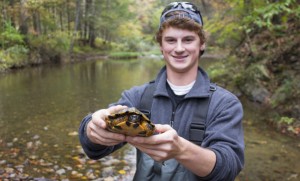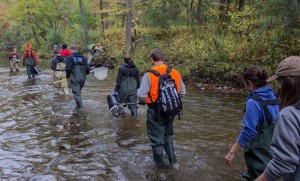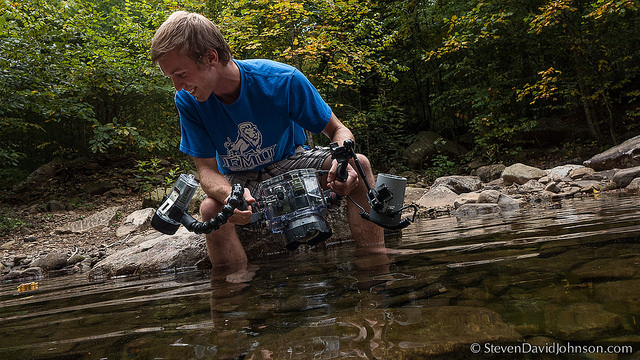A $200,000 grant from the National Fish and Wildlife Federation will give science, peacebuilding and digital media students at Eastern Mennonite University opportunity to work together on a stream restoration project in a rural community about 30 miles from campus.
The main goal of the two-year grant is to improve water quality along 17 miles of the German River and Crab Run, two tributaries of the Shenandoah River and the Chesapeake Bay. The streams drain a 38,000-acre watershed around Bergton, Virginia. About 10 percent of the land is agricultural (the land-use that contributes the most nutrient and sediment pollution to local streams), and Crab Run has been added to the federal “impaired waters” list because of high levels of E. coli bacteria.
Science professors Jim Yoder and Doug Graber Neufeld were the primary grant writers, and will guide teams of environmental sustainability students working on water quality monitoring and stream restoration. These will include working with landowners to adopt “best management practices,” like fencing cattle out of streams, to minimize pollution runoff, and conducting surveys of aquatic insects that indicate the relative cleanliness of a stream.
Hands-on lessons for students

Students will also have opportunity for real-world practice using GIS mapping software and get hands-on lessons in hydrology and restoration design under the supervision of Ecosystem Services, a stream restoration company that will be working in the watershed as part of the grant.
“These are very marketable skills [and] that’s a huge benefit for students,” said Yoder.
The grant will build on water monitoring work that Yoder and Graber Neufeld have been doing with environmental sustainability students in that area for the past three years.
“It’s been a lot of fun to go out for an afternoon and a day, instead of sitting in class, and being able to actually walk the stream and use the techniques we’ve been learning about,” said Bryce Yoder (no relation to Jim), a senior environmental sustainability major.
“It’s exciting to know that this is a project that has funding, and our research will actually matter, and eventually will contribute to restoring sections of [these rivers].”
Jesse Parker, another senior environmental sustainability major, has begun doing some GIS mapping of the streams, which he called “a really good skill to have with any environmental-related job.”
“This is a really cool opportunity for current and future students,” he added.
Another distinguishing aspect of the grant will be the involvement of digital media students, who will document the stream, the community that surrounds it and efforts to improve its water quality. These will include students in professor Steven Johnson’s “Conservation Photography” class, and video students working on a documentary with professor Paulette Moore.
CJP studying social dynamics
EMU’s Center for Justice and Peacebuilding (CJP) will also play a role in studying the social aspect of stream restoration, with special focus on the reasons why some landowners do and don’t take steps to protect water quality.
“There’s a cultural and relational component to small communities, [and often] there’s not a lot of attempt to understand those dynamics,” said Jayne Docherty, CJP program director and professor. “There’s also not a lot of attempt to figure out what are the complex social reasons that people might not adopt technical practices.”
Through interviews and group discussions with members of the Bergton community, CJP graduate students will study these questions, and create a guidance document based on their findings to inform watershed improvement efforts in other places.
“Hopefully we will have some outcomes that can be applied elsewhere, both from the restoration perspective and [understanding] the community dynamics,” said Graber Neufeld, who hopes that the recently awarded grant is just the beginning of a longer-term EMU involvement in Bergton. “The other thing that I would hope is that we can see some improvements in watershed health in a way that is congruent with people’s livelihoods out there.”

Great project! This is good for students as they will pay attention to the environmental protection issue and hopefully will think about it after the graduation from the university when they’ll get their job and will have more abilities to help nature.